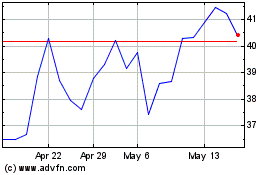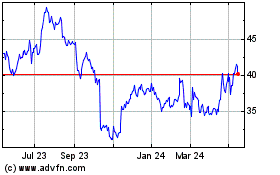Fresenius Medical Care Responds to Hurricane Sandy in the Mid-Atlantic Region
November 06 2012 - 5:23PM
Business Wire
Although more than 100 Fresenius Medical Care North America
(FMCNA) clinics in the mid-Atlantic region were affected by
Hurricane Sandy last week, all but one have now resumed
operations.
FMCNA, the nation’s leading network of dialysis facilities, is
pleased to report that all of its patients and employees are now
accounted for and safe, even though many were personally affected
by the storm, which caused power outages, widespread flooding and
significant property damage.
Patients needing emergency help or information about specific
dialysis clinics should call FMCNA’s toll-free Patient Emergency
Hotline: 1-800-626-1297.
The Fresenius Medical Care Disaster Response Team – assisted by
divisional, technical and regional employees, local governments and
community organizations such as the Kidney Community Emergency
Response (KCER) Coalition – worked overtime to prepare for and
respond to the storm. FMCNA and its partners continue to meet daily
to coordinate a variety of critical activities, such as:
- Providing extra treatments to patients
at clinics affected by the storm;
- Arranging treatments for patients
served by closed clinics, including patients from other dialysis
companies;
- Delivering generators, bottled water
and warm meals to facilities and employees in need;
- Providing gasoline for employees’ cars
and personal generators across New Jersey and New York;
- Supplying motor homes equipped with
personal supplies and generators to employees who lost homes or
whose homes are not safe to occupy.
“We have taken extraordinary steps to ensure uninterrupted
dialysis treatments for patients,” said Bill Numbers, FMCNA Vice
President of Operations Support and Incident Commander for Disaster
Response and Planning. “Fortunately, our advance preparation for
situations like this gave us a head start in planning how to
respond quickly and effectively.”
FMCNA’s disaster response plan has been tested and validated
many times in recent years, from Hurricanes Ike, Isaac and Katrina
to tornados, floods and severe thunderstorms. When such events
occur, FMCNA coordinates efforts across all levels of the company,
ensuring the ability of staff to provide patients with dialysis
treatments, equipment and supplies, medicines and lab services.
As a result, FMCNA was able to continue serving patients both
during and after the storm, in some cases by arranging for them to
receive treatment at alternative locations. The Fresenius Medical
Care Harlem clinic in New York City, for instance, opened at 5 a.m.
on Sunday before the storm to dialyze patients from southern
Manhattan, whose usual clinics were closed by emergency officials.
The Harlem clinic was able to offer uninterrupted patient care, in
part, by providing hotel rooms and cab fare for employees.
"When we heard Sandy was going to hit Manhattan, everyone at
Fresenius including, our regional vice president, area managers,
medical directors, nephrologists, nurses, patient care technicians,
support staff, technical group and educators - came together to
ensure our patients were cared for," said Erlyn Tanzo, R.N.,
clinical manager at Fresenius Medical Care Harlem. "I'm so proud to
work a company that truly cares about its patients and staff."
In New Jersey, FMCNA took the unusual step of bringing in a
gasoline tanker to alleviate fuel shortages that were hindering its
employees from driving to work. “This helps lift a major worry for
our team,” said Ananda Williams-Gray, R.N., area manager for
Fresenius Medical Care. “We’ve been able to provide treatment for
all our patients in the area without interruption, despite massive
power outages and gas shortages. Our team doesn’t have to wait two
hours at a gas station; they can depend on Fresenius Medical Care
for essentials, such as gas and power.”
While storms and other natural disasters can be inconvenient and
even life-threatening for entire communities, they pose an
especially serious health threat to dialysis patients whose
treatments are delayed by electrical power outages or inability to
access their normal treatment locations. Patients with end-stage
renal disease (ESRD) typically need dialysis treatment every two
days to clean waste products from their blood, remove extra fluids
and control their bodies’ chemistry after their kidneys have
failed.
For more information on FMCNA’s natural disaster response
efforts and important tips to help patients prepare for any
emergency, visit FMCNA’s Emergency Preparedness website.
About Fresenius Medical Care
Fresenius Medical Care (NYSE: FMS) is the world’s leading
company devoted to patient-centered renal therapy. Through more
than 3,119 clinics in North America, Europe, Latin America,
Asia-Pacific and Africa, we provide kidney dialysis treatments to
approximately 253,000 patients worldwide. We are also the world’s
leading maker of dialysis products, such as dialysis machines,
dialyzers and related disposable products. Chronic kidney failure
is a condition that affects more than 2.1 million individuals
worldwide. For more information about the company’s more than 2,100
U.S. dialysis facilities, visit www.ultracare-dialysis.com (in
English and Spanish). For more information about Fresenius Medical
Care, visit www.fmc-ag.com or www.fmcna.com.
Fresenius Medical Care (TG:FME)
Historical Stock Chart
From Dec 2024 to Jan 2025

Fresenius Medical Care (TG:FME)
Historical Stock Chart
From Jan 2024 to Jan 2025
